2017 江苏省常州市中考英语真题及答案
注意事项:
1. 本试卷共 8 页,全卷满分为 90 分,考试时间为 100 分钟。考生须将答案书写在答
题卡上,写在试卷上的一律无效。
2. 答题前,考生务必将自己的姓名、考试证号填写在试卷上,并填写好答题卡上的考
生信息。考试结束后,请将本试卷和答题卡一并交回。
一、单项填空(共 10 小题;每小题 1 分,满分 10 分)
从题中所给的 A、B、C、D 四个选项中,选出最佳选项,并在答题卡上将该项涂黑。
1. – _________ is it since you left your primary school?
– Three years.
A. How old
B. How long
C. How far
D. How soon
2. – How nice your dictionary is! Where did you get _________? I’d like to buy
_________, too.
– In the shop in the city centre.
A. it; one
B. one; one
C. one; it
D.
it;
it
3. My mother won’t allow my father to drive _________ he promises to give up
drinking.
A. unless
after
B. since
C. if
D.
4. A child should be encouraged to tell the truth instead of _________ stories
whenever he or she has done something wrong.
A. taking up
B. putting up
C. making up
D.
setting up
5. – Will Dad be back home at 6 o’clock this evening?
– He should, but he _________ not. Sometimes he exercises after work.
A. can
B. must
C. need
D. may
6. – Could you tell me how to behave politely in public in the UK?
– Yes. _________, you should keep your voice down and always queue.
A. After all
B. First of all
C. In all
D.
At
all
7. – Why doesn’t the surgeon stop _________ lunch?
– Because he is too busy _________ a dying patient in the operation room.
A. to have; to save
B. having; to save
C. to have; saving
D.
having; saving
8. I’ll never forget the town in which there _________ a clean river and many big
tall trees.
A. used to be
B. used to have
C. was used to being
D. was used to having
9. The shopping mall _________ for two years, but I _________ there only once.
�
A. has opened; have gone
C. has been open; have gone
B. has opened; have been
D. has been open; have been
10. – Could you look after my plants while I’m away on business, please?
– _________. I’ll water them on time.
A. Come on
C. Take it easy
B. With pleasure
D. You’re welcome
二、完形填空(共 12 小题;每小题 1 分,满分 12 分)
阅读下面短文,从短文后各题所给的 A、B、C、D 四个选项中,选出最佳选项,并在答题卡
上将该项涂黑。
On the first day of my 11th grade, I wasn’t excited when I looked at my timetable
and saw “Biology II — Robin Haworth, Room 301”. I had never liked biology and
I found it
11
. After I entered the room, I took a seat in the very back and
12
for my new teacher. The bell rang and Mrs Haworth entered the classroom. She began
to tell us how her class was going to be difficult and that if we weren’t up to
the
13
, she would gladly let us leave.
The class required lots of
14
. This was especially hard for me because I
was balancing a new school with a new part-time job. My grades soon began to
15
.
Just as I began to appear in a sea of D, Mrs Haworth asked me what was up. I told
her about the difficulty I was having. She listened to me and I knew she truly
16
my life and my problems. She told me that she
17
me but that I needed to learn
how to manage my time better. Mrs Haworth greatly
18
my ability by helping me
learn to solve my problems on my own. If I got a C in a test, she would hand it
19
and asked me to deal with the ones I missed and tell her why. She
20
increased
my grades but taught me how to study harder. I got to know that if I had done my
best for the first time I did it, I wouldn’t have so many
21
. And after many
trials, my grades became better.
I had never had a(n)
22
who opened up to me and treated me as her equal.
Over the past years she has taught me that if I want to be excellent, I am the one
who can make that happen.
11. A. amazing
B. practical
C. boring
D.
important
12. A. prepared
B. wished
C. searched
D. waited
13. A. experience
B. challenge
C. education
D.
value
14. A. competition
B. attention
C. conversation
D.
creation
15. A. fall
B. change
C. improve
D. miss
16. A. cheered for
B. cared about
C. looked after
D.
believed in
17. A. understood
B. recommended
C. admired
D.
�
remembered
18. A. supported
B. influenced
C. developed
displayed
19. A. back
20. A. even
B. in
B. ever
C. out
C. sometimes
D. over
D. never
21. A. businesses
B. mysteries
C. differences
mistakes
22. A. friend
parent
B. leader
C. adult
D.
D.
D.
三、阅读理解(共 13 小题;每小题 2 分,满分 26 分)
阅读下列短文,从短文后各题所给的 A、B、C、D 四个选项中,选出最佳选项,并在答
题卡上将该项涂黑。
The Blue Metropolis Literary Festival is coming!
A
It will host nearly 120 family-friendly activities from April 11 to April 17.
More than 40 writers and storytellers, including local writers Monique Polak and
Lydia Lukidis, will be joining in educational activities. It hopes to bring citizens
of different cultures together to enjoy reading and literature. Here are some of
the events of this year’s festival.
Tuesday, April 12, at 10:00 a.m.
Activity: The writer Monique Polak, who comes from Montreal, will discuss
her new
detective book and hold a workshop for kids between the ages
of 9 and 12 on
how they can be skilled at writing their own detective
tales.
Location: Benny Library, 6400 Monkland Ave.
Tuesday, April 12, at 4:00 p.m.
Activity: Lydia Lukidis, the local children’s writer, will be giving a talk
about the world of folk tales for kids aged 6 to 10. Lukidis will
present different folk tales, and then the kids will try their hands
at coming up with their own stories.
Location: Westmount Library, 4574 Sherbrooke St.
Wednesday, April 13, at 10:00 a.m.
Activity: Helaine Becker will help kids aged 6 and up master all the detailed
facts of comedy writing and cartoons.
Location: Ecole St., Germain d’ Outremont, 46 Vincent d’ Indy Ave.
Wednesday, April 13, at 1:30 p.m.
Activity: High school students will be presenting videos they created
honouring the unsung heroes of the Second World War.
Location: The Montreal Holocaust Memorial Centre, 5151 Cote St.
�
23. The festival is held mainly to __________.
A. encourage the cultural exchange from different areas
B. invite famous writers to introduce their new books to their fans
C. help people from different countries to build good relationships
D. gather people from different cultures to enjoy reading and literature
24. What can you learn from the local children’s writer Lydia Lukidis?
A. The content of the new detective book.
B. Tips for telling and writing folk tales.
C. The method of coming up with new comedies.
D. The unknown heroes of the Second World War.
25. If an 8-year-old boy likes comedies and cartoons, he can go to ___________.
A. Benny Library, 6400 Monkland Ave on Tuesday
B. Westmount Library, 4574 Sherbrooke St. on Tuesday
C. Ecole St., Germain d’ Outremont, 46 Vincent d’ Indy Ave on Wednesday
D. The Montreal Holocaust Memorial Centre, 5151 Cote St. on Wednesday
B
A 22-year-old British student has invented a mobile fridge that could save
millions of lives across the world.
Will Broadway’s “Isobar” has been designed to keep vaccines(疫苗) at the
ideal temperature while they are being sent in developing countries. And Will
doesn’t plan to make money from his creation. His purpose is to get vaccines to
people who need them, which is why he won’t be trying to get a patent(专利). Will’s
Isobar has won him the James Dyson Award that challenges young people to “design
something that solves a problem”.
Present methods of transporting vaccines can lead to the vaccines freezing(冻
住) before reaching their places in developing countries, but the Isobar keeps a
temperature of 2 to 8 degrees for 30 days.
Will’s invention is expected to save the lives of 1.5 million people across
the world, a number he says is “amazing”. Having now finished college education,
he is making an effort to take the Isobar into production. “I would be hands-on,
all the way through it, knowing that it works,” he says. “It’s amazing to just
give it a go, even in my back yard, and see the potential(潜能) of the technology.”
The product has been designed to transport vaccines, but already Will sees the
possibility for other medical uses in the developing world and beyond. “Blood
donations, organ transplants(器官移植) — if they get trapped in traffic, you still
use cold-bags that really aren’t good enough for a long time,” he says.
There is also a possible, non-medical use for the Isobar. “It would be a great
thing to take on a five-day trip where you have no power,” he says. But he insists
vaccine transportation is the primary function(功能) of his invention.
26. What’s the advantage of the Isobar for sending vaccines in developing countries?
�
A. It can save more energy.
B. It can send more vaccines at a time.
C. It can keep vaccines in an ideal condition.
D. It can transport vaccines at a faster speed.
27. The James Dyson Award is presented to _________.
A. old scientists who have developed modern technology
B. young men who have solved problems with their designs
C. doctors who have saved people’s lives in developing countries
D. college students who have got patents for their creative inventions
28. What is the passage mainly about?
A. The production of a new fridge and its future.
B. The invention of a new fridge and its inventor.
C. The transportation of vaccines and its problem.
D. The introduction of an award and its new winner.
C
I was bullied quite badly in high school. A kid would try to make me feel terrible
in every way he knew. For example, he would hit me in the head, call me ugly and
stupid, make fun of me and — of course — threaten(威胁) to hit me harder if I ever
fought back. It was like his daily task.
And it was my daily task to just get through the day. What can I say? It made
my world very small because that was my main focus — just surviving. Everything
else fell by the wayside. Unluckily, that included any form of social life. So not
only was my world tiny, it was lonely.
Looking back to that time — which was about 11 years ago — my biggest mistake
was not bringing anyone in to that world of mine. I was too proud, and embarrassed(尴
尬的), to get help. I would rather not face the fact that I needed help because in
my mind, that would mean that the bully won. It would also mean that I was weak.
Let me just say this — bullying someone is a weak choice. The only reason they
come after you is because they think you won’t do anything about it. Does that make
anyone strong? NO. Be stronger — reach out to a parent, a teacher or a friend.
Admit(承认) you need help.
You can put it like this: Somebody who is trying to make himself or herself seem
important has bullied me. Why? Simply because I am nice and I haven’t done anything
about it yet. Well, I hate this. I have basic human rights. It is just not OK. How
do I manage this the right way? I don’t want the pain cycle to continue and I don’t
want to become someone I don’t want to be.
I will close by saying this — I am OK! I am not just surviving. I am enjoying
my life. I graduated from college with good grades, by the way (being stupid was
a lie…it is all a lie). You don’t have to wait to live. Do something today.
�
29. The underlined word “it” in the first paragraph refers to(指) _________.
A. getting along with the writer
B. having a difficult time at school
C. making friends with other students
D. hurting the writer with force and threat
30. The writer suggests _________ to fight bullies.
A. getting used to the pain as soon as possible
B. looking for help from parents, teachers and friends
C. increasing the understanding of basic human rights
D. keeping it a secret inside and reducing your social life
31. The writer writes the passage mainly to _________.
A. share his thoughts on dealing with bullies
B. say that he regrets being hurt badly at school
C. describe how he changed his weak personality
D. show how thankful he was to those who helped him
D
Imagine you are walking through the woods and you see a small dog.
It looks cute and friendly. You move up to pet the dog. Suddenly it
barks and tries to bite you. The dog no longer seems cute and you feel
afraid and possibly angry. Then, as the wind blows, the leaves on the
ground are carried away and you see the dog has one of its legs caught
in a trap. Now, you take pity on the dog. You know it becomes unfriendly because
it is in pain.
We all judge(评判) others all the time. It might be over small things, like a
workmate who takes too long of a lunch break. Or it might be over bigger matters,
such as a person who behaves selfishly or hurts our feelings. There are many reasons
why we judge others. It is human nature to find a way to survive. When we see a dog
(or a person) that might bite us, of course we feel threatened(威胁). We become
nervous, want to fight back and are unable to see the possible reasons for another’s
behavior.
Although judgment is a natural reaction(反应), try to catch yourself before you
speak, for you can’t get your words back. Make a short stop. Try to change your
thought into a positive(正面的) one. After all, like that dog in the trap, we really
don’t know the reasons for someone’s behavior.
When someone disagrees with us or somehow makes our life difficult, remember
that it’s usually not about us. It may be about their pain or struggle(挣扎). Why
not give others the right to express their doubt? “Never underestimate the pain
of a person,” Will Smith said, “because in all honesty, everyone is struggling.
Some people are better at hiding it than others.”
�
32. The writer talks about the dog in the first paragraph mainly to _________.
A. give an example
C. share a good story
B. make a comparison
D. set the background
33. According to the writer, we usually judge others _________.
A. over big matters instead of small ones
B. after thinking carefully about their situation
C. about the real reasons behind their behavior
D. for our own survival when feeling threatened
34. What does the underlined sentence “Never underestimate the pain of a person”
mean?
A.
Never believe others have pain.
B. Never pay attention to others’ pain.
C. Never think others’ pain is bigger than it really is.
D. Never think others’ pain is smaller than it really is.
35. What is the best title of the passage?
A. The Best Way to Judge
B. Too Late to Judge
C. Think Twice Before You Judge
D. You’ve Got a Reason to Judge
四、阅读表达(共 5 小题;每小题 1 分,满分 5 分)
阅读下面短文,并根据所读内容在文章后表格中的空格里填入一个最恰当的单词。
注意:请将答案写在答题卡上相应题号的横线上。每个空格里只填一个单词。
British people pride themselves on their polite manners towards one another in
public. They often use the word ‘sorry’ — even when they don’t really mean it!
Usually, if they want to ask a stranger for the time, they would start by saying
‘Sorry to bother you. Do you know what time it is?’ If they’re five minutes late
for an appointment(约会), they would generally greet the person by saying ‘Sorry
I’m late!’
They use the word ‘sorry’ in so many different situations that the meaning
of the word has changed a little over time. The two main dictionary definitions(释
义) of ‘sorry’ are: 1) feeling sad for someone else because of their problems or
bad luck; 2) feeling regret because you’ve done something wrong. Now, think about
this. Normally, when they want to ask a stranger a question, they start with ‘Sorry
to bother you’. In this situation, they aren’t saying ‘sorry’ because they feel
sad for that person or because they feel regret.
So what does ‘sorry’ really mean? And why do British people use it so much?
Well, in the British culture, saying ‘sorry’, is a way to be polite, especially
to people who they don’t know very well. It’s also a very clever way to get what
they want. In a recent experiment, an actor went up to different strangers on a rainy
day to ask if he could use their mobile phones in order to make a call. When he went
up to one group of strangers and asked them without saying ‘sorry’ first, he was
�
only 9 per cent successful in borrowing their phones. However, when he said ‘sorry’
to another group of strangers about the bad weather before asking if he could use
their mobile phones, he was 47 per cent successful. So maybe saying ‘sorry’ is
not just being polite, but it is also a good method to get what they want too!
Title: Why do British people say sorry?
Detailed information
asking for the time
being late for an appointment
Main points
The (36)▲
in which they say
‘sorry’
The change of the
meaning of ‘sorry’
The (39)▲ meaning
of ‘sorry’
The two main dictionary definitions of ‘sorry’:
1
2
feeling sad for others’ problems or bad luck
feeling regret because of one’s own (37)▲
When British people ask a stranger a question by
starting with ‘sorry’, they are saying ‘sorry’
(38)▲ because they feel sad for that person nor
because they feel regret.
a way to be polite
a good way to get what they want
The result of an experiment shows it’s easier for one
to (40)▲ in borrowing a mobile phone by saying
五、词汇(共 8 小题;每小题 1 分,满分 8 分)
‘sorry’.
A)根据句子意思,用括号中所给词的正确形式填空,每空填一词。
41. Qi Baishi was one of the most famous
▲
(art) in China.
42. The ORBIS doctor advised the girl to have the operation to prevent her eye problem
getting much
▲
(bad).
43. To complete the work, he drank some coffee to keep himself
▲
(wake).
44. To protect the earth, we mustn’t throw away the waste
▲
(care).
B) 根据句意及汉语提示,写出各单词的正确形式,每空填一词。
45. We must be
▲
(勇敢的) enough to face difficulties in our life.
46. Some wild animals are in
▲
(危险) as the earth is getting warmer and
warmer.
47. Mary goes to work every day
▲
(除…..之外) Sundays.
48. The general manager always thinks twice before
▲
(回 复) to the
customers.
六、用括号内所给动词的正确形式填空(共 5 小题;每小题 1 分,满分 5 分)
49. I had my finger cut when I
▲
(divide) the watermelon into pieces.
50. Last year, the light-coloured car
▲
(sell) better than the
�
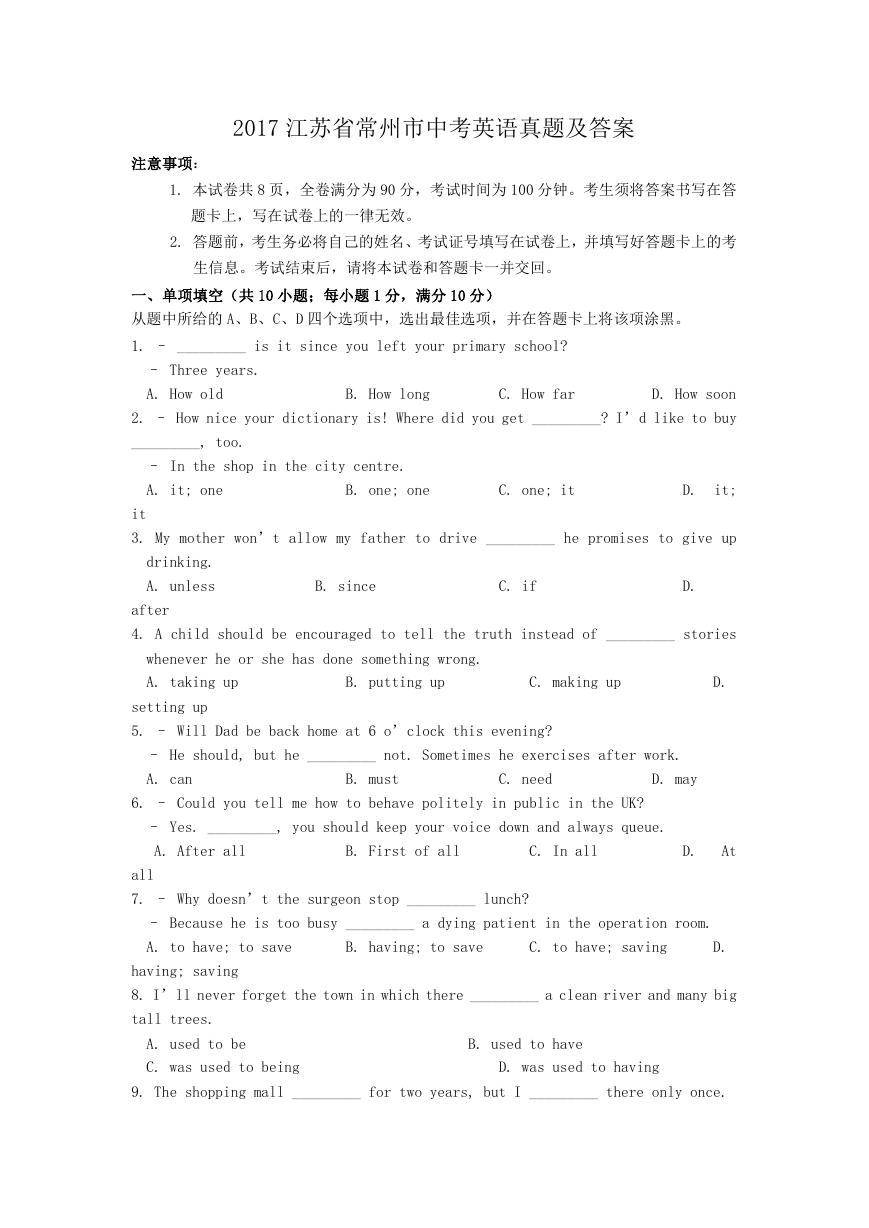
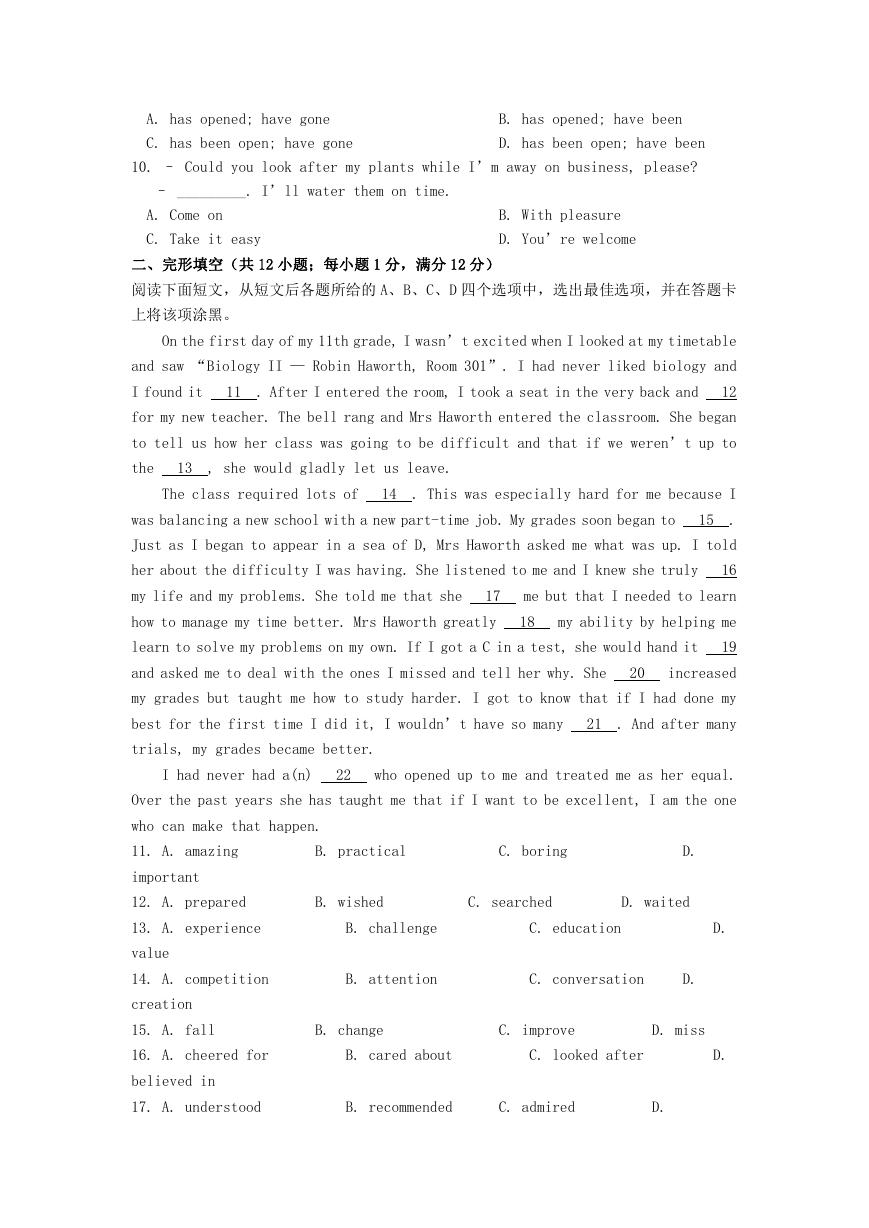
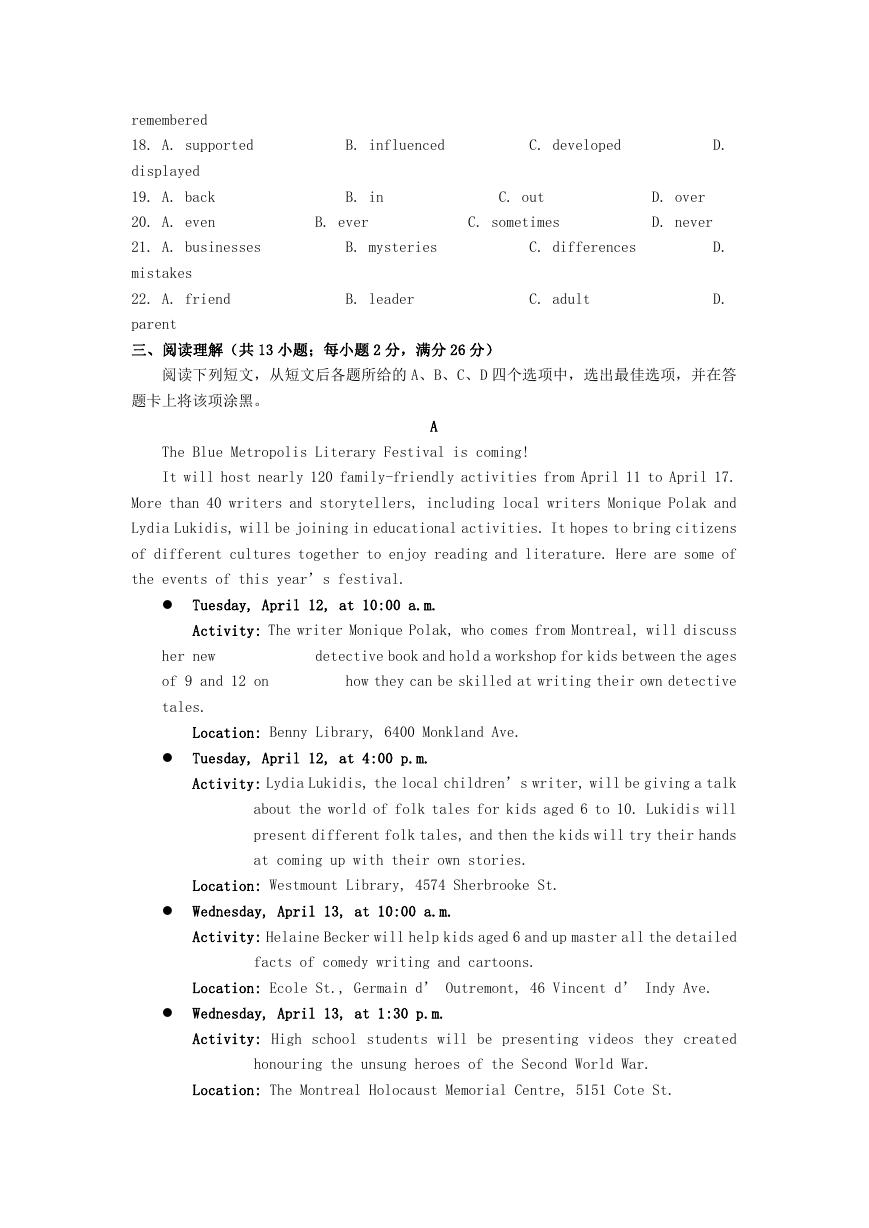
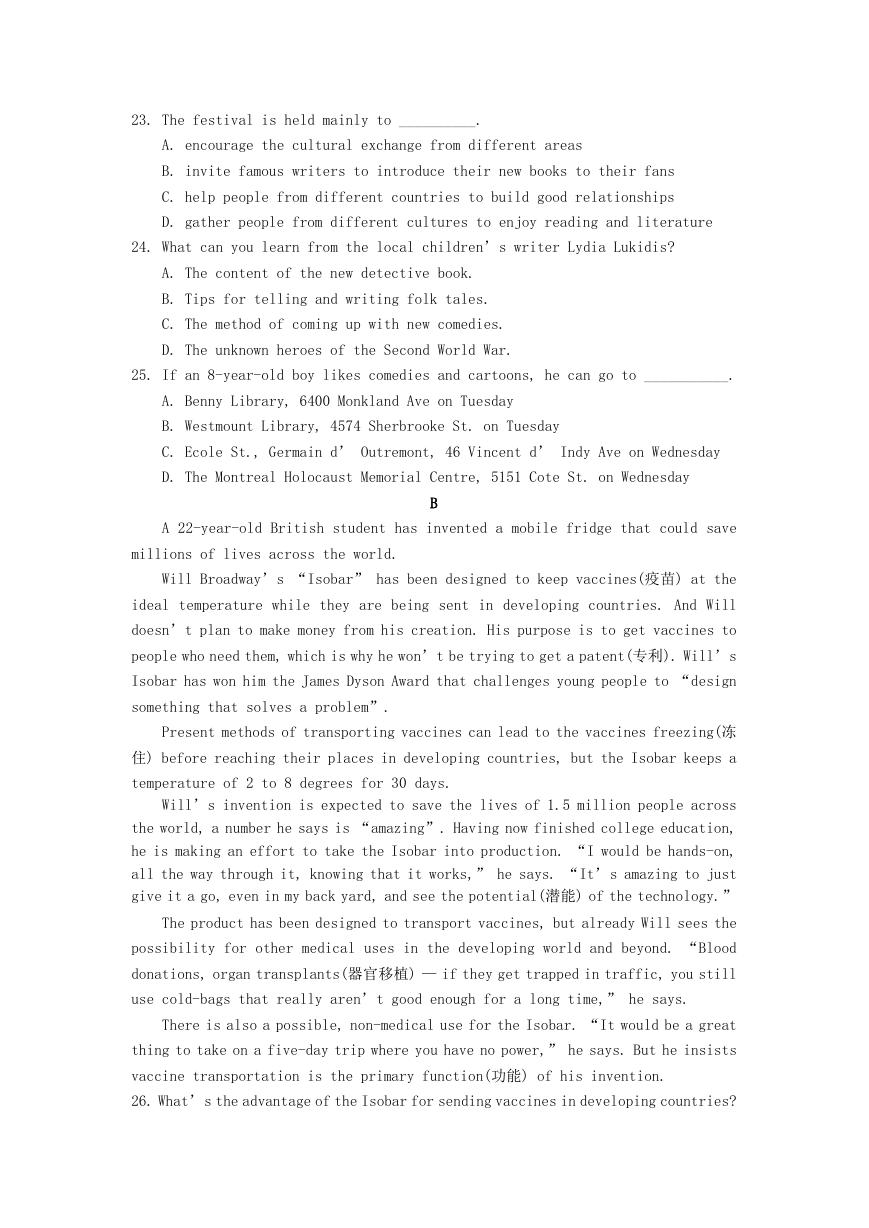
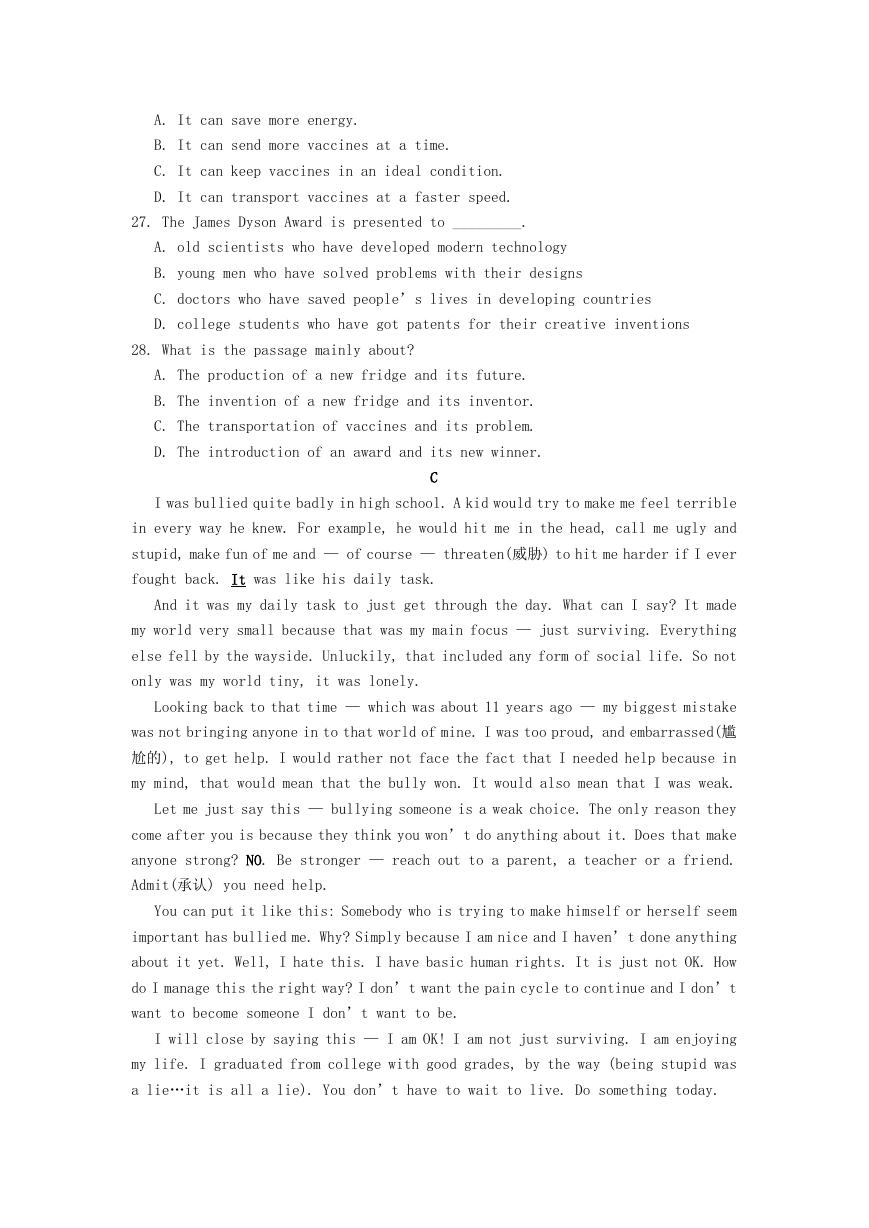
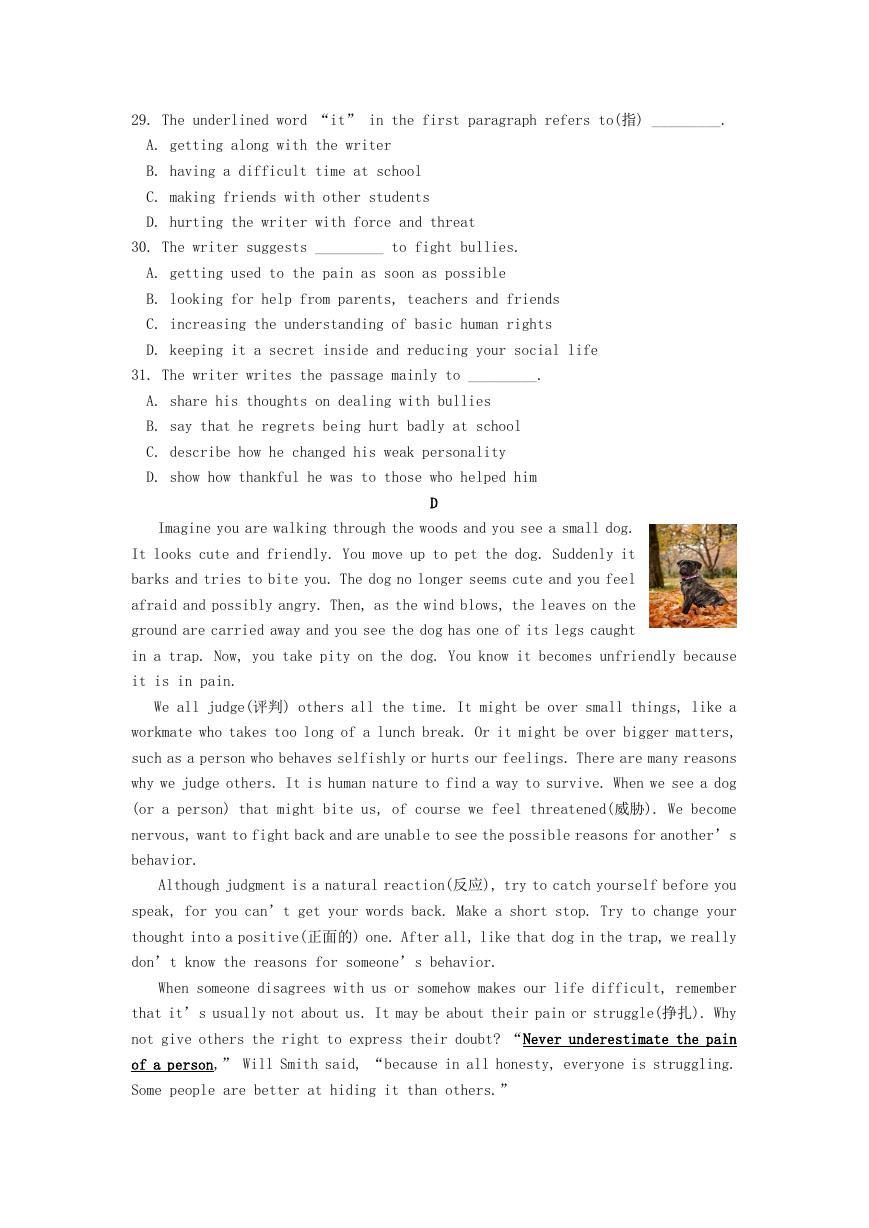
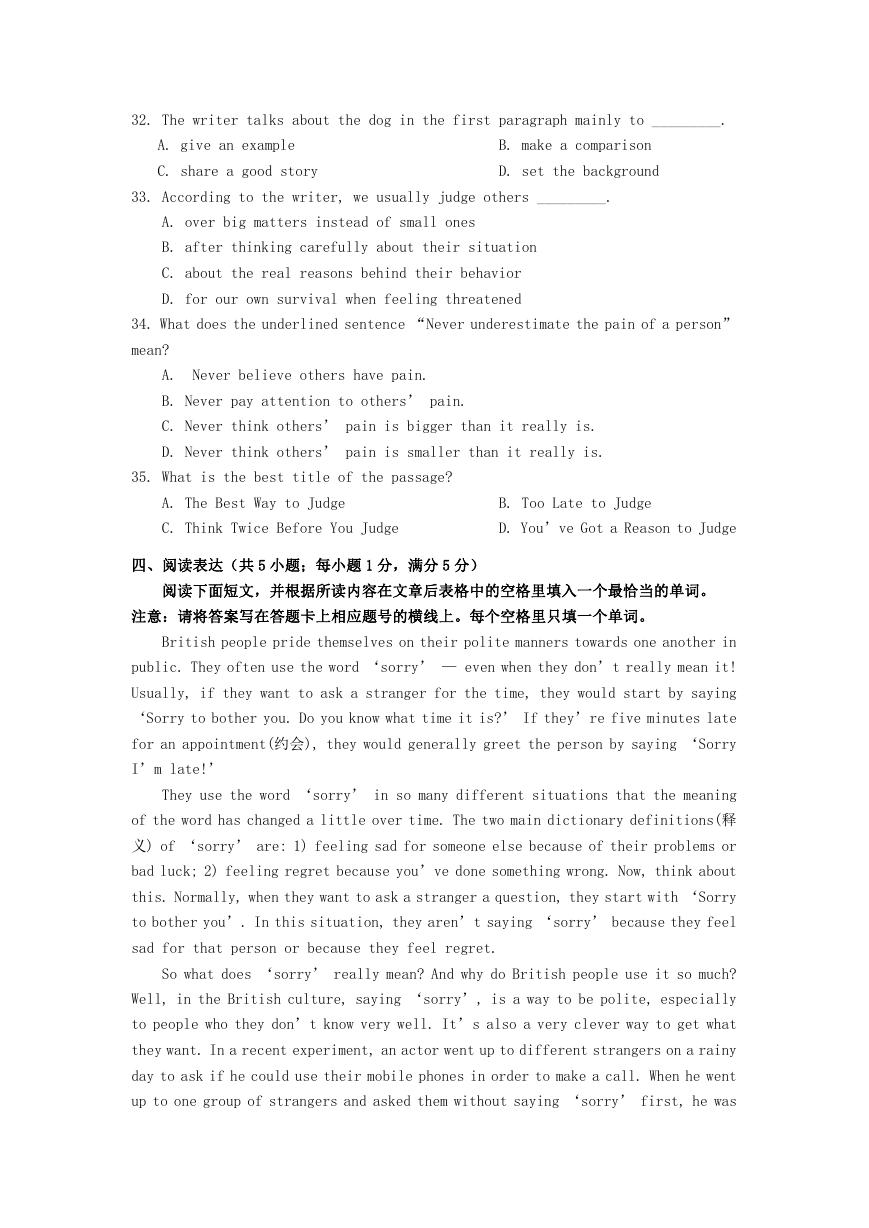
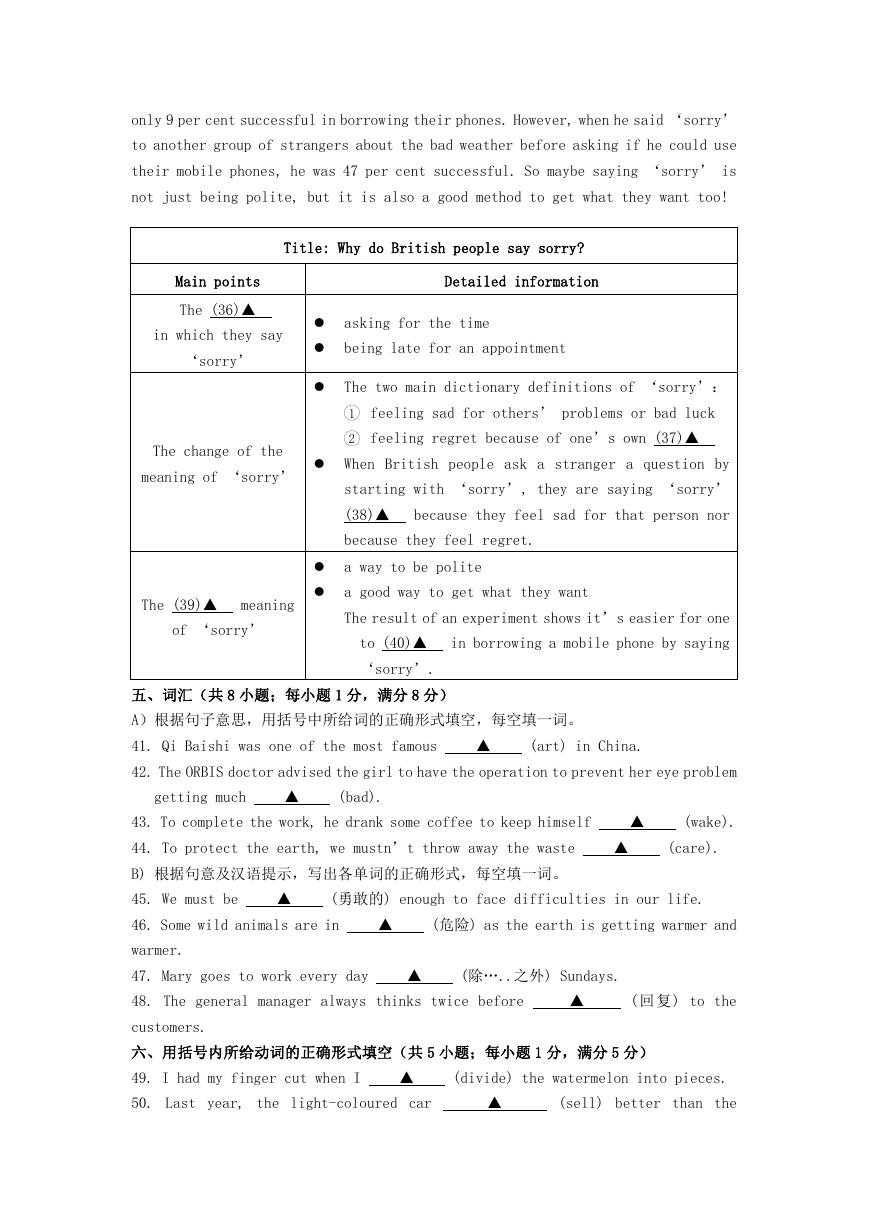








 2023年江西萍乡中考道德与法治真题及答案.doc
2023年江西萍乡中考道德与法治真题及答案.doc 2012年重庆南川中考生物真题及答案.doc
2012年重庆南川中考生物真题及答案.doc 2013年江西师范大学地理学综合及文艺理论基础考研真题.doc
2013年江西师范大学地理学综合及文艺理论基础考研真题.doc 2020年四川甘孜小升初语文真题及答案I卷.doc
2020年四川甘孜小升初语文真题及答案I卷.doc 2020年注册岩土工程师专业基础考试真题及答案.doc
2020年注册岩土工程师专业基础考试真题及答案.doc 2023-2024学年福建省厦门市九年级上学期数学月考试题及答案.doc
2023-2024学年福建省厦门市九年级上学期数学月考试题及答案.doc 2021-2022学年辽宁省沈阳市大东区九年级上学期语文期末试题及答案.doc
2021-2022学年辽宁省沈阳市大东区九年级上学期语文期末试题及答案.doc 2022-2023学年北京东城区初三第一学期物理期末试卷及答案.doc
2022-2023学年北京东城区初三第一学期物理期末试卷及答案.doc 2018上半年江西教师资格初中地理学科知识与教学能力真题及答案.doc
2018上半年江西教师资格初中地理学科知识与教学能力真题及答案.doc 2012年河北国家公务员申论考试真题及答案-省级.doc
2012年河北国家公务员申论考试真题及答案-省级.doc 2020-2021学年江苏省扬州市江都区邵樊片九年级上学期数学第一次质量检测试题及答案.doc
2020-2021学年江苏省扬州市江都区邵樊片九年级上学期数学第一次质量检测试题及答案.doc 2022下半年黑龙江教师资格证中学综合素质真题及答案.doc
2022下半年黑龙江教师资格证中学综合素质真题及答案.doc